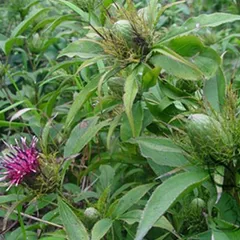Spleen Qi Sinking
The information provided here is not a replacement for a doctor. You shouldn't use it for the purpose of self-diagnosing or self-medicating but rather so you can have a more informed discussion with a professional TCM practitioner.
At a glance
Preliminary reading: What is a pattern? The Spleen in Chinese Medicine The concept of Qi The concept of Qi Sinking
Key attributes
Chinese name: 脾气下陷 Pinyin name: Pí Qì Xià Xiàn
Pattern nature: Empty
Causes
Precursor patterns: Spleen Yang Deficiency Lung Qi Deficiency Spleen Blood Deficiency and one other possible precursors
Common causes: 1. Diet, 2. Emotional stress, 3. External Dampness, 4. Chronic diseases, 5. Mental-excertion, 6. Long hour Standing
Diagnosis
Common symptoms: Poor appetite Slight abdominal distension after eating
Pulse type(s): Weak (Ruo)
Tongue description: Pale tongue
Treatment
Treatment principle: Tonify Spleen Qi, raise Spleen Qi
Common formulas: Bu Zhong Yi Qi Tang
Pathology
The causes of Spleen Qi Sinking is quite similar to the ones of Spleen Qi Deficiency, which are unbalanced diet, unhealthy eating habits, emotional stress or Damp environment. Other than these, people who have to stand up for long hours every day have a tendency to obtain this pattern.
Spleen Qi Sinking is a type of Qi Deficiency, therefore both pattern's can give rise to various digesting issues such as poor appetite, slightly abdominal distension and pain after eating or loose stools. The Spleen Qi is so weak that it fails to transport Food-Qi throughout the body, hence the symptoms of pale tongue and complexion, general fatigue, lassitude and weak limbs.
When the Spleen Qi is Deficient or Sinking for a long period of time, Body Fluids can not be transformed properly. It then accumulates and form Dampness and Phlegm. It leads to symptoms such as overweight or even obesity.
Apart from above common symptoms, Spleen Qi Sinking has its unique manifestations as the sense of bearing down and the prolapse of various Organs.
When the Spleen Qi sinks, it fails to raise Qi so that it can not hold the Organs in their original places in Lower and Middle Burners. Therefore some Organs prolapse such as the Uterus, the Anus, the Bladder or the Stomach. Also, patients often complain about frequent and urgent urination as well as Heavy Menstruation. This occurs more obviously if this pattern is paired with Kidney Qi sinking.
Causes
Precursor patterns: Spleen Qi Sinking can derive from Spleen Yang Deficiency Lung Qi Deficiency Spleen Blood Deficiency Spleen not controlling Blood
Diet: Nowadays our diets are rich in sugars, fats, iced drinks, junk food and cold raw foods. This harms the Spleen function of transformation and transportation and leads to Spleen Qi Deficiency or Qi Sinking. Other bad eating habits also impair Spleen Qi, such as inconsistent meals, eating standing up or on the run, eating while reading or discussing business over meals, eating too little or too much food, or eating a protein-deficient diet.
Emotional stress: Emotional stress, especially pensiveness and worry, can greatly weakened the Spleen function and cause Qi Deficiency or Sinking there.
External Dampness: Prolonged exposure to external Dampness can largely harm the Spleen and cause Deficiency or Sinking there. The Dampness here can be a nature environment or artificial ones such as air condition or refrigerated storage spaces.
Chronic diseases: Any long-term illness tends to weaken the Spleen, causing Deficient or Sinking Spleen Qi.
Mental-excertion: Mental-excertion on work or study can largely deplete the Spleen Qi and cause its Deficiency or Sinking
Long hour Standing : Patients who have to stand for long hours every day, are more prone to this pattern.
Diagnosing Spleen Qi Sinking
Diagnosing a pattern in Chinese Medicine is no easy feat and should be left to professional practitioners. In particular one has to know how to differentiate between different types of pulses and tongue coatings, shapes and colors as well as learn to read from a long list of seemingly unrelated symptoms.
Pulse type(s): Weak (Ruo)
Tongue description: Pale tongue
Main symptoms: Poor appetite Slight abdominal distension after eating
Diagnosis commentary: The key characteristic symptoms of this pattern are the weak pulse and sensation of bearing down.
Treating Spleen Qi Sinking
Treatment principle
Tonify Spleen Qi, raise Spleen Qi
Herbal formulas used to treat Spleen Qi Sinking



The top herbs in Bu Zhong Yi Qi Tang are Milkvetch Roots (Huang Qi), Atractylodes Rhizomes (Bai Zhu) and Ginseng (Ren Shen)
Bu Zhong Yi Qi Tang
Source date: 1247
Number of ingredients: 10 herbs
Key actions: Tonifies Qi of the Spleen and Stomach (Middle Burner). Raises the Yang. Detoxifies. Lifts what has sunken.
Formula summary
Bu Zhong Yi Qi Tang is a 10-ingredient Chinese Medicine formula. Invented in 1247, it belongs to the category of formulas that tonify Qi.
Besides Spleen Qi Sinking, Bu Zhong Yi Qi Tang is also used to treat Qi Deficiency or Qi Collapsing or Qi Sinking.
Diet recommendations
Eat only cooked foods, including rice, millet, meat (especially red beef), winter squash, adzuki beans, vegetables, greens, congee and warm drinks such as warm milk with ginger, cinnamon or cardamom and honey.
Avoid cold, raw vegetables and fruits, juices, iced drinks, ice cream and frozen yogurt, salads, uncooked foods and the excessive use of sugar and other sweeteners.
As for other therapies, try breathing exercises, meditation or moxibustion over the lower abdomen and Kidneys.
As for sport, try mild aerobic exercise such as Yoga, Tai Chi, Qi Gong, swimming, walking or light cycling. Do avoid intense exercise.
Consequence patterns
The precursor pattern of Large Intestine collapse is always Spleen Qi Sinking.
Qi is a kind of Yang elements, thus Deficiency or Sinking of Spleen Qi can cause Deficient Yang in the Organ.
When Spleen Qi is Deficient or sinking, the Spleen fails to fulfill its function of holding Blood in the vessels.
This is why bleeding symptoms appears all over the place: under the skin, in the stools, the urine or from the Uterus.
Spleen Blood Deficiency is always preceded by Spleen Qi Deficiency or Sinking because the Deficient Food Qi (Gu Qi) fails to produce enough Blood in the Spleen. This situation is much more common in women.
Blood Deficiency is often a result of Spleen Qi Deficiency or Qi Sinking because the Deficient Food Qi (Gu Qi) fails to produce enough Blood for the body in general.
A Spleen Qi Deficiency may also affect the Heart, giving rise to Heart Qi and often Heart-Blood Deficiency. On the other hand, Spleen Qi Sinking is a type of Spleen Qi Deficiency and both pattern has similar characters.
According to Five Phases theory, Earth (the Spleen) is the Mother of Metal (the Lungs). Therefore Spleen Qi Deficiency or Sinking often leads to Lung Qi Deficiency and vice versa.
Spleen Qi Deficiency or Qi Sinking may also lead to Kidney Yang Deficiency, especially if there is Dampness.
When the Spleen Qi is Deficient or Sinking for a long period of time, Body Fluids can not be transformed properly. It then accumulates and form Dampness or Phlegm.
